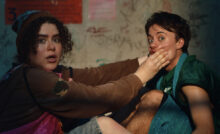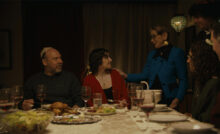Exclusive Interview: Traci Hays Talks Directing ‘On the Run,’ Bringing Female-Centric Stories to the Forefront, and More


Traci Hays is an award-winning director whose work has made an indelible mark on audiences and earned acclaim from viewers and critics worldwide. Celebrated by publications such as Vulture, The Hollywood Reporter, and Variety, Traci is known for bringing female-centric stories to the forefront. And her fourth feature, On the Run, is no exception.
Available now on Tubi, the action-thriller follows two teen sisters learn about their family’s involvement with a secret program and go on the run to escape the deadly criminals targeting their family.
Pop Culturalist was lucky enough to catch up with Traci to talk about On the Run, her friendship with writers Becky Wangberg and Sarah Eisenberg, sisterhood, the film’s timely themes, and more.
PC: Becky and Sarah approached you about directing On the Run. What was it about their script and the concept that resonated with you and made you want to be a part of it?
Traci: It all came together at once. Becky and Sarah were pitching loglines to MarVista/Tubi, and the one that really struck me had a strong focus on female-centered characters—something I’m always drawn to—as well as the theme of complicated family dynamics, which deeply interests me. These elements were central to the script for On the Run, and as we began developing it together, the story’s world expanded in such a fulfilling way. At its core, the story’s focus on family, Witness Protection, and the bond between two sisters is what initially captivated me.
PC: You did a deep dive into the Witness Protection Program after Becky and Sarah approached you. What discoveries did you make about the program during that time? How did that influence the script and allow you to bring authenticity to the screen?
Traci: There’s not much information out there, I’ll say that much. [laughs] And it makes sense—it’s Witness Protection, after all. They don’t want you to know how the program is run. Interviews are rare, probably because people are still in Witness Protection for all we know.
It’s a subject that’s often been portrayed inaccurately in movies. They definitely don’t get it right. There wasn’t a wealth of information readily available. The major turning point in my research came when I discovered Jackee Taylor’s podcast, which was absolutely incredible. After leaving the Witness Protection Program, she came forward and shared her experiences in-depth over more than seven hours. It was incredibly informative. Although she was younger than the characters in our movie, her firsthand account was invaluable. It informed the authenticity of the script—what people would know, what they wouldn’t, how they entered the program, and when they were taken.
That podcast, along with the book WITSEC, which is short for the Witness Protection Program and was co-written by the program’s founder, Gerald Shur, in the ’50s, was also a key resource. The book explains why Shur started the program and his determination to include women in its fold. It was very inspiring to read his story and brought a lot of depth to our understanding of the program.
PC: I love the care you always bring to all of your projects. This is the first feature from Becky and Sarah, and I feel like that’s an experience you always remember. What was the standout moment from your directorial debut? What did you learn from that experience that you were able to bring over to On the Run?
Traci: This project has such a different tone from what I’ve been working on over the last few years. My first love is genre—very specific, grounded, dark, gritty work. Those are the elements I’m passionate about, so it felt like coming back to my happy place, being able to work in that space again.
I’ve known Becky and Sarah since film school. They became a writing team after college, but I actually started working with Becky during our college days. She wrote all the films I directed back then, so we already had that shorthand. I was familiar with Becky’s style, but working with both of them on On the Run was a whole new experience. It was so much fun because we were constantly spitballing ideas. The process was incredibly collaborative, open, and vulnerable, allowing us to really dig into the best notes and ideas. They’re pros—they know what they’re doing.
PC: It was also important to you, Becky, and Sarah to infuse your own experiences with your siblings into the dynamics between these two characters, and how they come together not only to survive but to thrive. How have your siblings shown up for you in a similar way, and vice versa?
Traci: It’s funny—I was just thinking about this, but we haven’t all met each other’s siblings yet. I have three younger siblings—two sisters and a brother. When I reflect on the dynamic between my sisters and me, I realize how different we were growing up. We fought a lot; they would steal my clothes, and it would drive me crazy.
Now that we’re adults, we love spending time together and have, so to speak, matured. But I wanted to capture that teenage angst, the bickering, and the reality of how sisters argue and fight. It was important to bring those authentic dynamics into many of the scenes between the two characters.
Ultimately, they have to set aside their differences and rely on each other. They get into a bit of a pickle because of their fighting, and we needed to show those consequences. At the same time, you want the characters to grow. So, I definitely drew from my own experiences with my sisters—but I love them; they’re great.
PC: One of the most interesting parts of the filmmaking experience is how each actor brings their unique process to character development and finds their way in. What was it like collaborating with Sofia [Masson] and Taylor [Geare] and creating the space for them to explore these characters?
Traci: I mean, we had so little time—it was crazy. We ended up casting Sofia just four days before we started filming. It was like a boot camp, honestly. We went at it with 150% effort. Taylor joined the project a couple of weeks before Sofia, so I had a chance to meet with her in Los Angeles. We talked about the characters and any concerns she had, especially since there were some vulnerable scenes for her. We were able to get on the same page before filming, ensuring she was comfortable. Taylor is very open and dedicated. She even had to learn new guitar riffs for the movie—that’s actually her playing. She really immersed herself in the role quickly. From her first tape, I knew Taylor was Paige, and the same went for Sofia.
Of course, I wished Sofia had more time. I would have loved to build our relationship more before filming, but we did talk on Zoom and had some great conversations. Sofia is very visual, and her process is similar to mine—creating Spotify playlists, making mood boards on Pinterest, and really getting into the character. I could tell she was very meticulous in how she prepared. Then it was straight into boot camp on set.
We spent every day together, getting to know each other’s quirks. It definitely wasn’t glamorous. We didn’t have weeks or months to rehearse, plan, or dream. It was just like, “Go.”
PC: As someone who has followed your career, I’ve noticed you’ve always used genre as a unique lever to explore timely themes. Is there one in particular that resonated with you in this film? What do you hope audiences take away when it comes out on Tubi?
Traci: I think that’s because of my background in production design. I’m really drawn to visually cinematic, genre-blending stories—that’s my M.O. I infuse that into everything I do; I can’t help it. The artistic flair I bring is all about elevating every project I work on.
As for what I hope people take away from On the Run, I hope it’s an entertaining ride. But beyond that, I want them to recognize the importance of family, even if it’s a broken one. Whether it’s chosen family or not blood-related, the people in your life are ultimately so important. If there’s a rift they’re working through with someone, I hope they see a positive outcome through the challenges these characters face.
PC: You also have a longstanding relationship with Tubi and have had so much success with them. How do you think streaming platforms have changed the industry? How has their trust and partnership impacted your own journey as a storyteller?
Traci: It’s crazy, right? Movies come out, and the next day you can watch them on a streaming service. It’s fascinating how there was almost this gold rush of content right before the pandemic, then a bit of a blip afterward as everything slowed down due to the strikes. Suddenly, everyone was reevaluating everything. What’s interesting about streaming platforms now is they’ve created so many opportunities for filmmakers because of the sheer volume and need for content. Filmmakers who might not have had opportunities before are now getting those meetings.
This is especially true for women and underserved voices—those things are important to Tubi. Their model is shifting as we speak, and they’re making incredible strides and taking big swings with their projects. It’s an exciting place to be right now. I’m eager to see how things shift as we move into the rest of the year and into the future. There’s a lot of uncertainty; many filmmakers are wondering, “What does our next job look like?”
Tubi is very much focused on quality over quantity, which influences how much content gets out there and finds its audience. On one hand, it sounds like a better opportunity to level up and work on bigger projects with bigger budgets. But it might also mean fewer opportunities overall. It’s hard to predict with the checks and balances of streaming. I’m just as curious as you are about where things are headed. It feels like something changes every week.
To keep up with Traci, follow her on Instagram. Watch On the Run on Tubi today.
Photo Credit: Jackie Rangel
Recent Posts
SXSW 2025: Siobhan McCarthy, Misha Osherovich, and Nico Carney on Reclaiming Comedy Classics with Trans Inclusion in ‘She’s the He’
Comedy classics like Mean Girls, She’s the Man, and Clueless have shaped generations with their…
Daring, Unpredictable, and Unforgettable: Tyler Cornack’s ‘Mermaid’ Dives into SXSW 2025 with Stars Johnny Pemberton and Avery Potemri
To say Tyler Cornack is a visionary would be an understatement. His fearless approach to…
SXSW 2025: Daisy Friedman and Arielle Friedman on ‘Unholy,’ Authentic Representation, and Capturing the Pressures of Family, Tradition, and Identity
There’s nothing more powerful than a filmmaker reclaiming their own story, but true brilliance comes…
Inside ‘Sweetness’: How Writer-Director Emma Higgins and Her Cast Built One of SXSW’s Most Unforgettable Films
Sweetness isn’t just a film—it’s a layered, unsettling portrait of fame, grief, fixation, and the…
SXSW 2025: Jim Sturgess and Rory Walton-Smith Talk ‘Mix Tape’ and the Music and Memories That Shape Us
Few projects at this year’s SXSW are likely to strike a chord quite like Mix…
Exclusive Interview: MayMay Entrata on Finding Strength in Vulnerability, Embracing a New Era, and the Story Behind “Paradise”
From breaking barriers as the first Filipina to walk in Arab Fashion Week to delivering…


